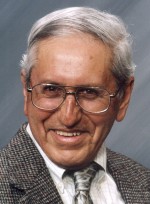In 2006, when my book, “On The Move: A History of the Hispanic Church in the United States,” was published, Father Virgilio Elizondo was one of those whose comments appeared on the flyleaf.
He wrote:
“Sandoval’s book is a real gem! Reads like a diary. Such a book could have only been written by someone who has lived most of the journey himself and has reflected critically on the tears and laughter, the persistence and perseverance, the sacrifices and the fiestas of a people determined to remain faithful Catholics.”
I quote this only to point out the juxtapositions: tears and laughter, persistence and perseverance, the sacrifices and fiestas. They were the blueprint of his life. Recognized as the leading Mexican-American theologian, he wrote that one of the gifts that his people bring to the church is the ability to celebrate life, no matter how bleak and discouraging the times may be.
Father Elizondo wrote that the totality of life is reflected in the fiesta. “It brings the whole day into the celebration of the fact that life is a gift. Life is to be lived, appreciated and celebrated.” For him, our celebrations, large or small, were the precursors of the celebration that awaits us when we reach our eternal destiny.
[hotblock]
This is why his recent death, of a self-inflicted gunshot, caused such profound sadness. It seemed that his vision failed him at the end. Those of us who knew him hope that a lavish fiesta nonetheless awaited him, for he was an inspiration to many of us: always cheerful, insightful, creative, helpful, hopeful, a joy to be with.
As I thought and prayed for Father Elizondo, a great friend of many years, I became aware of how our lives were linked. In 1981, when Celebration Books in Kansas City published a small volume titled “A Martyr’s Message of Hope: Six Homilies by Archbishop Oscar Romero,” I was invited to do a note at the beginning of the book and Father Elizondo wrote the one at the end. In 1983, when the Mexican American Cultural Center published “Fronteras: A History of the Latin American Church in The USA Since 1513,” I was the editor and he wrote the introduction. That was the pattern.
If I was invited to speak at a conference, he was likely to be a speaker as well, giving the keynote while I likely had a workshop; he was better at that game than I was.
I do not recall the first time I met Father Elizondo, but when I started traveling regularly to the Mexican American Cultural Center, which he founded with Archbishop Patrick Flores in 1972, he welcomed me with the traditional: “Mi casa es tu casa.” And when he saw I did not take him seriously, he said: “No, I mean it. When you come to San Antonio, you stay with us. No reservation needed. We will find you a room.”
The center was then in an old building, formerly the seminary, and without air conditioning. It was so hot at night in the summer that one could not sleep. But the hospitality and the people one met there made up for it. “When we are together, we have no doubt that we are a family,” Father Elizondo wrote in the introduction to “Fronteras.” “Pues somos en todo sentido una familia,” which means, “Well, we are a family in a total sense.” And that is how it felt to be there.
Because I believe that an entire life cannot be nullified by a crushing moment of despair, I am confident that when Father Elizondo arrived at his eternal home, he heard the welcoming words: “estas en tu casa,” or “You are home.”
PREVIOUS: Confirmation is a ‘yes’ to life in the church, not ‘I’m done’
NEXT: Strong parents can help girls navigate a fetid pool




Share this story